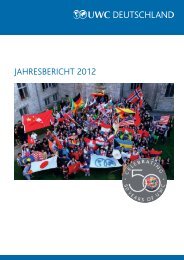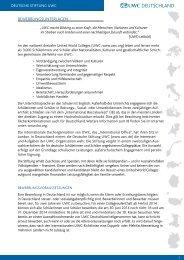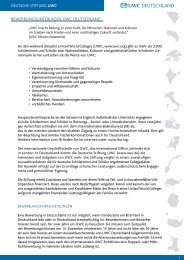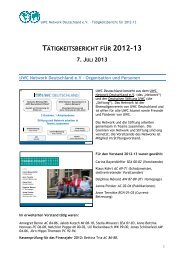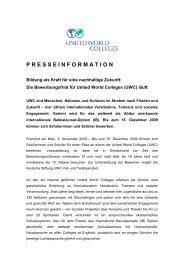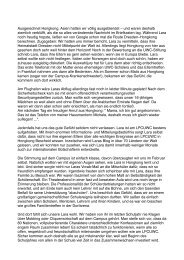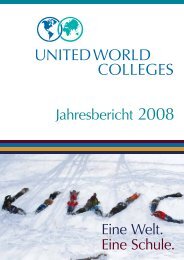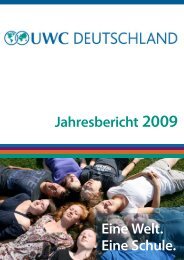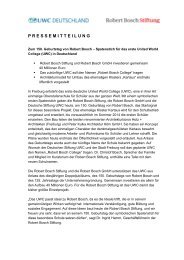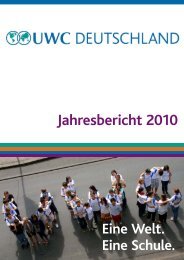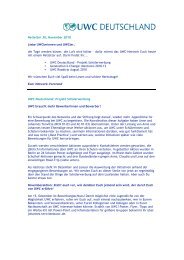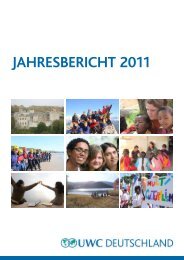An interview with Laurence Nodder - UWC in
An interview with Laurence Nodder - UWC in
An interview with Laurence Nodder - UWC in
You also want an ePaper? Increase the reach of your titles
YUMPU automatically turns print PDFs into web optimized ePapers that Google loves.
and the focus of the region on susta<strong>in</strong>ability. Christian Hodeige also took me to the<br />
neighbour<strong>in</strong>g villages and it seemed to me that this is a part of the world <strong>with</strong> a sense of<br />
history, rootedness and productivity. I talked to a w<strong>in</strong>egrower, who expla<strong>in</strong>ed to me how many<br />
w<strong>in</strong>egrowers are mov<strong>in</strong>g away from huge commercial agriculture to smaller but personalised<br />
productions. <strong>An</strong>d this theme of susta<strong>in</strong>ability seems to be present everywhere <strong>in</strong> the region.<br />
Before, you talked about the College <strong>in</strong> Freiburg be<strong>in</strong>g a professional challenge for you: Why are<br />
you <strong>in</strong>terested <strong>in</strong> this challenge?<br />
Every pr<strong>in</strong>cipal dreams of the opportunity to build a college from scratch. You are not given<br />
the compromises that other people have made <strong>in</strong> the years before. You start <strong>with</strong> a fresh sheet<br />
of people. <strong>An</strong>d you are work<strong>in</strong>g out <strong>with</strong> people, both the adults - the Board, advisory<br />
committees, wider society- and of course <strong>with</strong> the students, what could represent an ideal<br />
community. That is the challenge and the promise that this project holds. In ten years time I<br />
will be able to look at what is there and say: I had a<br />
“To “To “To build build build the the the theme theme theme of of<br />
of<br />
strong role <strong>in</strong> the mak<strong>in</strong>g of that. <strong>An</strong>d that is a wonderful<br />
susta<strong>in</strong>ability susta<strong>in</strong>ability <strong>in</strong> <strong>in</strong> from from the the very<br />
very challenge <strong>in</strong> one’s life.<br />
core core rather rather than than a a philosophy<br />
philosophy<br />
that that that gets gets gets ta tagged ta tagged<br />
gged on, on, will will be be very very<br />
Of course the road won’t always be even: Part of the<br />
excit<strong>in</strong>g.” excit<strong>in</strong>g.”<br />
excit<strong>in</strong>g.”<br />
upcom<strong>in</strong>g challenges will be, that even though people<br />
will come to the College <strong>with</strong> a sense of hope and<br />
idealism, we all come from different backgrounds and we will have compet<strong>in</strong>g ideas about<br />
what it should look like. But it is this process of engagement <strong>with</strong> others that is difficult but<br />
reward<strong>in</strong>g as people work th<strong>in</strong>gs out. <strong>An</strong>d someth<strong>in</strong>g special of course at Freiburg will be the<br />
focus on susta<strong>in</strong>ability. Every <strong>UWC</strong> embraces the notion of that <strong>in</strong> some way or the other. But<br />
none of them have been founded <strong>with</strong> an eye on it as a key issue. To build that <strong>in</strong> from the<br />
very core rather than a philosophy that gets tagged on, will be very excit<strong>in</strong>g. Waterford<br />
Khamlaba for example was founded as the first non-racial school <strong>in</strong> Southern Africa. <strong>An</strong>d that<br />
is different than br<strong>in</strong>g<strong>in</strong>g non-racialism <strong>in</strong> as an add-on. A model <strong>with</strong> an add-on is always a<br />
slightly compromised model.<br />
What does this focus on susta<strong>in</strong>ability mean to you? How are you plann<strong>in</strong>g on approach<strong>in</strong>g it?<br />
In recent years more and more people are com<strong>in</strong>g to realise that the manner <strong>in</strong> which we as<br />
humans are liv<strong>in</strong>g on this planet earth is not susta<strong>in</strong>able – our environment, our societies and<br />
<strong>in</strong> several <strong>in</strong>stances our economies are <strong>in</strong> grave danger of collapse <strong>in</strong> the not-too-distant<br />
future. Yet much of the discourse around these issues is shallow and dishonest: for <strong>in</strong>stance so<br />
often we are told that the use of certa<strong>in</strong> products and<br />
technologies - rather than others - is “good” for the earth, “If “If we we take take the the the concept concept of<br />
of<br />
whereas the truth is that <strong>in</strong> many <strong>in</strong>stances our use of these ‚susta<strong>in</strong>ability’ ‚susta<strong>in</strong>ability’ primarily primarily as as a<br />
a<br />
products and technologies is only slightly less damag<strong>in</strong>g, a market<strong>in</strong>g market<strong>in</strong>g slogan, slogan, we we will will have<br />
have<br />
more complicated truth.<br />
failed failed failed our our genera generation.” genera generation.”<br />
tion.”<br />
As <strong>UWC</strong> we must be particularly careful: if our carbon consumption matters, the reality is that<br />
while there is an <strong>in</strong>credible amount to be ga<strong>in</strong>ed from br<strong>in</strong>g<strong>in</strong>g together people from different<br />
parts of the world and people <strong>with</strong> different lived realities, our carbon impact per capita is<br />
higher than almost any other educational organization. We can justify this if we as <strong>UWC</strong><br />
pioneer, <strong>with</strong><strong>in</strong> school<strong>in</strong>g, <strong>with</strong> an honest discourse, if through search<strong>in</strong>g we learn to ask the<br />
important questions, if through our community we grow a deep commitment to explor<strong>in</strong>g<br />
susta<strong>in</strong>able ways to live, to order<strong>in</strong>g our societies and our economies. If we take the concept of<br />
‘susta<strong>in</strong>ability’ primarily as a market<strong>in</strong>g slogan, as today’s fashionable concept, we who<br />
consume so many resources and are given so much opportunity will have failed our<br />
generation. If we are will<strong>in</strong>g to probe deeply and to live consequentially, <strong>UWC</strong> can make a<br />
profound impact <strong>in</strong> the world.



